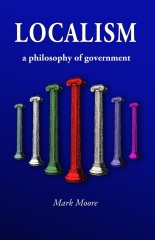One can see from the above example that when one link in the chain goes bad, one investment does not work out, that it causes tremors for everyone else along the chain. When people's wealth consists of a chain of debtors repaying their debts, when one does not pay it can affect the ability of the others to repay, leading to a series of cascading defaults. Of course, if relative small fry default on their debts, the creditor can absorb the loss and move on. It is only when a big player fails that a catastrophic system-wide failure is induced. This is what was about to happen in 2008. It is what is meant by the phrase "too big to fail."
No politician wants a catastrophic system failure on their watch, especially one which takes down their party's top donors. So the political system, Republicans and Democrats alike, bailed out the "too big to fail" banks, foreign and domestic. As Thomas Jefferson noted, "Merchants have no country".
Nor it appears, do the politicians they purchase. If the super-rich had taken the hit and had to write off their bad debts, maybe we would be out of our economic malaise by now, perhaps with a different set of people in the "super-rich" category. But the present super-rich were not about to give up that status just because they made poor decisions. They own the government now, and they have used their pull, plus the threat of Mutual Destruction for the present Political Class, to do whatever it takes to sustain an unsustainable system built on ever increasing debt and centralization of wealth (and therefore political power).
When the "too big to fail" banks made poor investments, the government bought them or accepted them as collateral for loans so that the banks could purchase sound investments instead. The Big Banks keep all of their winning bets, their bad bets are transferred to the taxpayer's books. Not so when a little or medium sized person or company fails. They go under and their assets are acquired at bargain basement prices, usually these days by the same Big Players who got bailed out when they made poor investments. It is easy to see that in a game where when the Big Players trip the government helps pick them up at our expense but when we trip we go bankrupt, that over time the Big Players are going to own virtually everything.
The ruling class has one goal, staying the ruling class. They don't want to hyper-inflate the dollar, because that would cause the basis of much of their wealth (claims to the debt payments of others) to vanish. They want the dollar strong and dear, but they also want to issue lots of money to bail themselves out, form the basis of much of their wealth and buy off the lower classes with welfare. With heavy debt loads, debtors groan under a strong dollar. When there was dollar inflation debtors could pay loans back in cheaper dollars. Now that the dollar is (artificially) stronger debtors are having to repay in dollars which are more expensive and it is pushing many into default. If enough of them default, the system of wealth based on ownership of others' debts collapses, so they don't want that either.
The solution they seem to have hit upon is to bail out the Big Players when they make poor decisions, but let the little guys descend into the lower class when they slip up. They have found a way to keep the money circulating tightly between Washington and Wall Street, with little of it trickling down to Main Street. If a Big Player gets caught in a situation where their investments go south and so they can't pay their debts, bail them out. When a little guy has investments that go south, they are liquidated and lose middle-class or upper middle-class status and become members of the lower class. As debt-fueled deflation takes hold, this is happening to more and more people. To keep the swelling lower classes from rioting against the government whose corrupt policies helped make them lower class, the government has "bought off" this group with welfare programs, paid for with more debt.
The only end of this course of action is the utter destruction of the Middle Class. The ruling class makes money off of the debt used to pay for the welfare programs and servicing government contracts so they "get back" the share of the bill which goes to them. Only the middle class in the private sector does not and that is why they are being squeezed. It ends with the population divided into "people connected to the system" and "poor people" subsisting on welfare.
Actually, that is not quite the end. At that point, once the last of the middle class whose hard work and wealth have been used to fuel the economy have been thrown into the debt-shredder, this thing implodes anyway. The system failed in 2008. Ever since the ruling class has been buying time with policies hastening the destruction of the middle class, making their losses our losses.
The good news in this rather depressing story is that there are ways to organize society so that our posterity is never again subjected to the deprevations which we now face. There are ways to engage the political system more effectively than we have been doing it. We did not get into this mess overnight and it won't be fixed overnight, but it can be fixed. That is what Localism, a philosophy of government is about.
